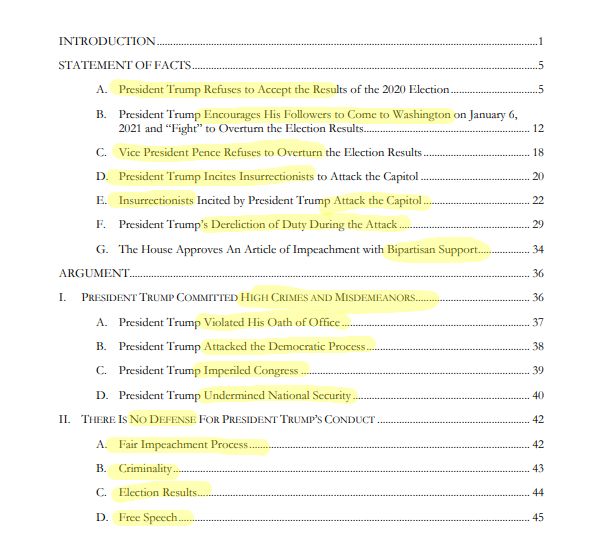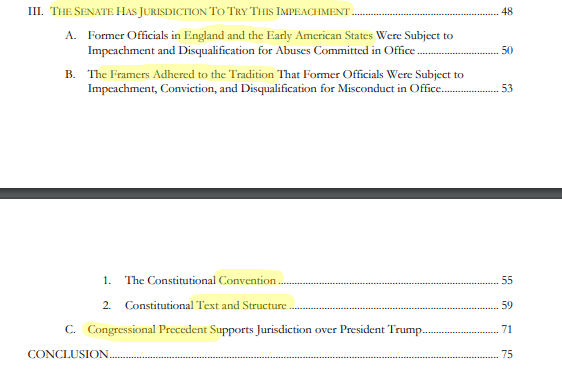OK, let's start talking about the House's 80 page brief on impeachment. It really is an incredibly well-done piece of work. There are some things I'd do differently and some pieces I didn't love, but overall, it's very very good.
Again - this thread will happen in fits and starts. I'm swamped at work and this will come in 10-15 minute chunks as I take a break
Let's start by taking a look at the table of contents. After a 4-page intro (that's relatively long, don't love it), the brief spends a solid 30 pages walking through the facts underlying the impeachment - and, the subheadings tell us, tying in Trump's general refusal to accept
the election results with everything that followed. This is a strong rhetorical approach, but it comes with dangers: the President not only had a legal right to contest the election results, but the GOP Senators pretty much all backed that right, strongly.
It's going to be important to thread a needle of saying "this set the stage for what came after" without putting yourself in a place where you're trying to convince the Senate that the challenges themselves were impeachable. That won't fly
Also - 30 pages is an incredibly long statement of facts. Most full-length briefs aren't that long. So expect it to be very, very detailed. That's important, because the primary argument on incitement is "given the context, these words incited the attack" - so the context is key
The argument section is broken up - smartly, I think - into three separate chunks.
1) Why, on their own merits, Trump's conduct requires conviction
2) Why Trump's defenses don't fly
3) The Senate can convict Trump even though he's out of office
1) Why, on their own merits, Trump's conduct requires conviction
2) Why Trump's defenses don't fly
3) The Senate can convict Trump even though he's out of office
Again, there are some key strategic choices being made here. The section on Trump's conduct conspicuously - and, I'd have to assume, deliberately - does NOT identify any supposed statutory crime. These are purely political offenses
Another (smart) strategic choice: Attacking the defenses in separate sections, rather than interweaving the response with the affirmative case. Those defenses are likely to be the core of the Trump response, not factual argument, so they need to be addressed prominently & head on
Last (for this break, we'll be back) take a look at the page counts. They spend 6-7 pages (36-42) on the affirmative case. Another 6-7 pages (42-48) on the various defenses *other* than "but I'm an ex-President!"
And 27 pages - again, a whole brief by itself - on "ex-President"
And 27 pages - again, a whole brief by itself - on "ex-President"
That tells you a lot about where the House is losing votes.
They're pretty confident that they can get whatever R-votes are gettable on the basics; after all, those Senators lived through the Capitol assault, they know what's what. But ...
They're pretty confident that they can get whatever R-votes are gettable on the basics; after all, those Senators lived through the Capitol assault, they know what's what. But ...
They may need to convince a bunch of even those unicorns - GOPers who'd be willing to convict on the merits - that they can't acquit based on "he's already out of office"
So that's where they'll spend their substantive time
So that's where they'll spend their substantive time
OK, client work awaits. We'll pick this up again later

 Read on Twitter
Read on Twitter



